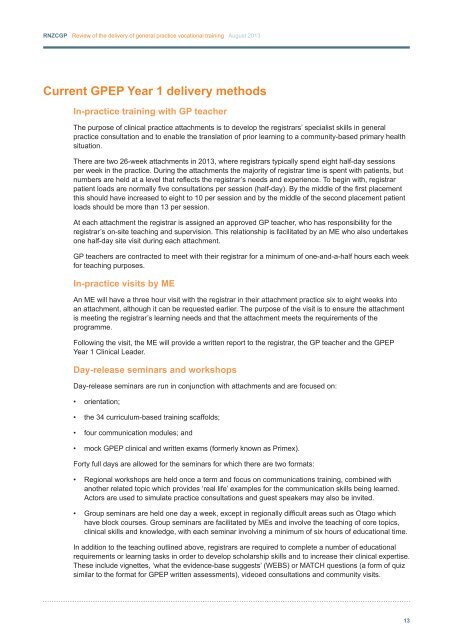AUGUST 2013 - New Zealand Doctor
AUGUST 2013 - New Zealand Doctor
AUGUST 2013 - New Zealand Doctor
Create successful ePaper yourself
Turn your PDF publications into a flip-book with our unique Google optimized e-Paper software.
RNZCGP Review of the delivery of general practice vocational training August <strong>2013</strong>Current GPEP Year 1 delivery methodsIn-practice training with GP teacherThe purpose of clinical practice attachments is to develop the registrars’ specialist skills in generalpractice consultation and to enable the translation of prior learning to a community-based primary healthsituation.There are two 26-week attachments in <strong>2013</strong>, where registrars typically spend eight half-day sessionsper week in the practice. During the attachments the majority of registrar time is spent with patients, butnumbers are held at a level that reflects the registrar’s needs and experience. To begin with, registrarpatient loads are normally five consultations per session (half-day). By the middle of the first placementthis should have increased to eight to 10 per session and by the middle of the second placement patientloads should be more than 13 per session.At each attachment the registrar is assigned an approved GP teacher, who has responsibility for theregistrar’s on-site teaching and supervision. This relationship is facilitated by an ME who also undertakesone half-day site visit during each attachment.GP teachers are contracted to meet with their registrar for a minimum of one-and-a-half hours each weekfor teaching purposes.In-practice visits by MEAn ME will have a three hour visit with the registrar in their attachment practice six to eight weeks intoan attachment, although it can be requested earlier. The purpose of the visit is to ensure the attachmentis meeting the registrar’s learning needs and that the attachment meets the requirements of theprogramme.Following the visit, the ME will provide a written report to the registrar, the GP teacher and the GPEPYear 1 Clinical Leader.Day-release seminars and workshopsDay-release seminars are run in conjunction with attachments and are focused on:• orientation;• the 34 curriculum-based training scaffolds;• four communication modules; and• mock GPEP clinical and written exams (formerly known as Primex).Forty full days are allowed for the seminars for which there are two formats:• Regional workshops are held once a term and focus on communications training, combined withanother related topic which provides ‘real life’ examples for the communication skills being learned.Actors are used to simulate practice consultations and guest speakers may also be invited.• Group seminars are held one day a week, except in regionally difficult areas such as Otago whichhave block courses. Group seminars are facilitated by MEs and involve the teaching of core topics,clinical skills and knowledge, with each seminar involving a minimum of six hours of educational time.In addition to the teaching outlined above, registrars are required to complete a number of educationalrequirements or learning tasks in order to develop scholarship skills and to increase their clinical expertise.These include vignettes, ‘what the evidence-base suggests’ (WEBS) or MATCH questions (a form of quizsimilar to the format for GPEP written assessments), videoed consultations and community visits.13
















